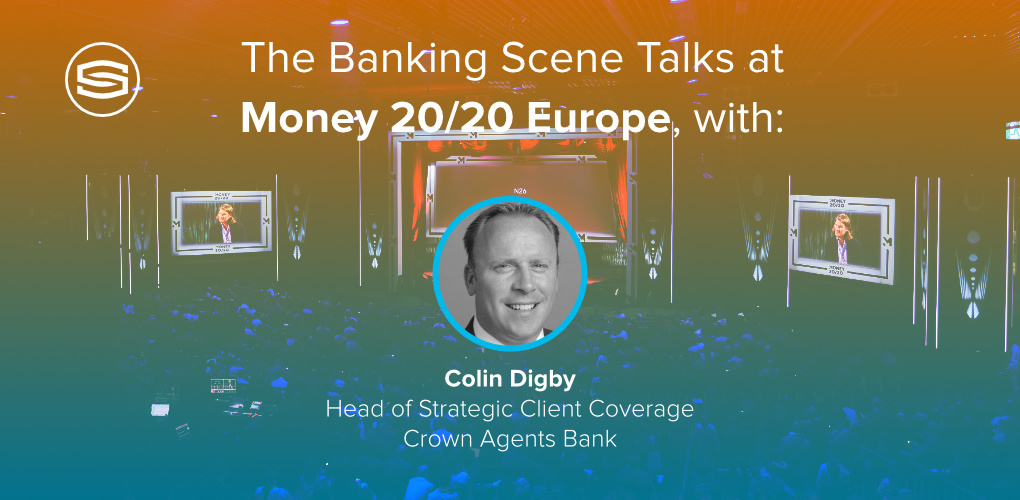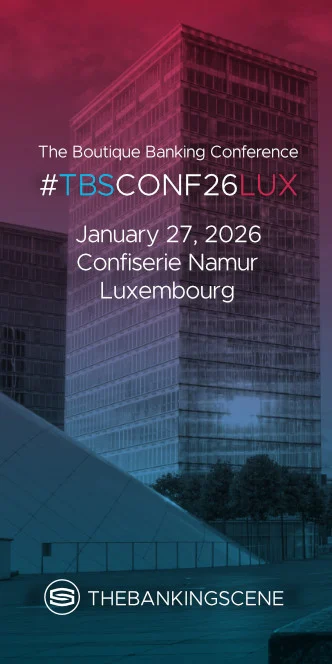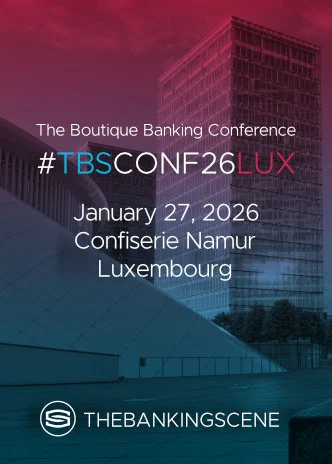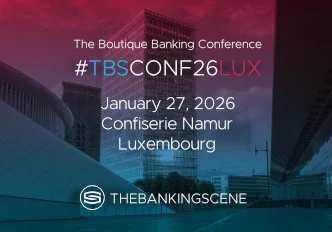
Insights & Opinions
The Banking Scene Talks at Money 20/20 EU with Colin Digby, Head of Strategic Client Coverage, Crown Agents Bank
Wed, 28 Jun 2023


Money 20/20 Europe is the yearly 3-day discovery of inspirational new ideas, meeting change-makers in the industry and discovering new companies that achieve real impact for the Fintech and Financial Services Industry.
This year, I discovered that Crown Agents Bank is such a company. Partnering with banks, fintechs, governments, central banks and international development organisations, it specialises in FX and payments business, connecting hard-to-reach markets to the global economy.
Rik Coeckelbergs spoke to Colin Digby, Crown Agents Bank's Head of Strategic Client Coverage.
Hello Colin, what a pleasure to speak to you. If I understand it well, Crown Agents Bank is quite an unusual bank, isn't it?
Colin Digby: Indeed, two things really stand out when comparing us with other banks. The first is that we don't lend money. We're not a lending bank, so our balance sheet is relatively small compared to most other banks dealing with international payments and trade.
The second differentiator is that in 2016 we were sold to a private owner. Until then, historically, we were owned by the UK government for 183 years. Within that, we have years of experience working with emerging market banks, governments, and central banks.
This change of shareholders completely changed the corporate strategy and culture, I suppose.
Colin Digby:Yeah, it did. It's interesting how expectations suddenly become completely different. As you expect from a 183-year-old-government-owned bank, there were quite a lot of manual processes and systems which were okay but not leading edge.
Over the last five or six years, we spent a lot of money on reengineering the stack.
2016 was really when the next chapter started for us. We needed to evaluate the direction to go for this new chapter. We've carved out now three distinct business lines- three pillars.
One is the global and emerging market banks along with the commercial banks, and the central banks in those emerging markets. They're often clients of ours for which we might do dollar clearing or other FX services, as well as, for example, some trade finance. They're also quite often our liquidity partner. So they're also our network., and it's a symbiotic relationship.
That's probably one of the most critical elements of our model. The heritage goes way back. That core network is one of the unique components of our bank.
We can help with payments and FX to these emerging markets, with a very long tail of currencies that most of the traditional big banks have no intention to serve, like Sub-Saharan Africa, the Caribbean and Latin America - the underserved markets, where traditionally it is extremely difficult to move money in and out. These are the regions where, when you make payments, the money may disappear for a week or two weeks.
The second pillar is the international development organisations. We're pumping in billions of dollars of local currency for development projects, humanitarian disasters, things of this nature. So when we're sending money in for a remittance player, or sending money in for charities, NGOs (non-governmental organisations), multilaterals or development organisations, we make sure their payments are processed in a trusted way through our reliable network.
That’s why we’re being so successful, because even those other players who may or may not be in the market, generally don’t have that relationship with a network they’re just paying through.
And then the third pillar is the fintech payment companies, remittance firms, and non-bank financial institutions.
How are the revenues for the bank split over those three pillars?
Colin Digby: Last year, the revenue was pretty much evenly distributed, exactly a third each. We are growing in all segments, but notice that the third pillar of fintech companies, remittance firms and non-bank financial institutions is probably growing a little bit more aggressively.
One reason for this growth is that we are onboarding more clients. On top of that, the clients we have got are doing more with us. They’ve realised the reliability of the delivery and in combination with the good rates it is helping them win more business. So naturally, there’s a lot of organic growth in the book.
How is the economic situation affecting your business? For the better or, the worse?
Colin Digby: Good question. In terms of growing business, it isn’t affecting us much. Of course, higher interest rates is good for a bank because you have more income from the interest. So that’s been quite a big plus for us this year.
If you look at the clients we’re serving, so certainly on a consumer level, where we deal with all the large remittance flows, we see that families or diaspora workers in the Western markets are sending more money back.
Add to that that they will do it more digitally than we were used to before – COVID had a massive impact on us. We’ve seen a flight to quality in terms of the people not going into cash stores so much and doing everything online. And they’ve stayed online. As we only do online, we benefitted from that organic growth.
First of all, we’re a wholesale bank. Our clients might come to us with corporate flows. That is genuinely doing pretty well, and we’re not seeing a massive decline in that economically, especially in the markets we’re dealing with.
So if you say, Sub-Saharan Africa, there’s an awful lot of agricultural imports, exports that people are having to pay in the local currency. So that’s not falling off. If anything, I’d say Africa is making progress on the agricultural side of things, scaling volumes, and using more tech.
Are there any plans to conquer Continental Europe?
Colin Digby: Yes, we have; that is why we are here. And we'll probably push that agenda harder in the next couple of years. So yeah, I think that we have plans to further expand in mainland Europe, we have plans to expand in the US and Asia as well. So I think they're the primary focus points in the next 12 to 18 months.
Going back to the change in shareholders, I can imagine that the reason, the purpose why you're into banking shifted. Where in the past, you were serving society and governmental organisations, you're now making a return for shareholders.
Colin Digby: Absolutely. The commercial balance has changed. One particular line of business that we still do and are really quite excited about is the pension business. We do pension payments for governments all over the world. And some of them we've been doing for 50, 60, 70 years, maybe even longer, but they were manual payments.
They also have, what we call, a proof of life process. So we'd be checking that you're still alive in some country somewhere, and we'd write to you manually, and you'd go to a local notary and pay 30 bucks whatever and send it back to us.
But now, we've invested in biometric technology, giving users an app on their phone or laptop, whatever, and these people can log in from the comfort of their own homes. We built that just prior to COVID. So we launched the product just around COVID time, which was perfect, and now obviously carries over. So far, many of our existing clients love the product and have signed up.
It is a market that's quite often relatively slow to adopt change in technology, but they love the whole proof of life thing. We now have a portal that they can white label for their clients so that pensioners can log in and see all the data, so they're never likely to have to build that tech themselves. We're perfectly placed to leverage the existing clients.
Now we're rolling that out to a whole raft of new clients. Again, it's another way to take the bank's core capabilities and lay technology on top of them for various verticals. We've got a single API for our clients. So clients that want to connect via API can do FX, make payments, and see real-time reporting.
And then, in the NGO and multilateral market, they've got different challenges. They've got to disburse funds on the ground in hard-to-reach markets where many people don't have bank accounts. They may not have a mobile phone. So we've adopted biometric-type card solutions and other things to disperse funds.
So we've just been building out what I call the layering of the front-end tech, and at the same time, improving the backend with bots and AI to automate a lot of those processes to scale.
Those kinds of improvements are kind of kicking in quite nicely.
Very interesting. Thank you very much.
Conclusion
In the meantime, we learned at Fintech Uncut, that Crown Agents Bank is considering going IPO. In these uncertain times, this shows how ambitious and confident they are in the near future, and it will be interesting to follow up on how they will evolve going forward.
For more Money 20/20 Europe 2023 discovery, you are advised to have a look here:
The Banking Scene Talks at Money 20/20 EU with John Mitchell, CEO and Co-Founder Episode Six
Andrew Vorster’s Reflections from The Banking Scene's Money 20/20 EU Boat



